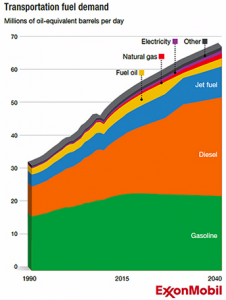8 item(s) were returned.
Energy independence has been a goal of the United States since the oil crisis of the 1970s. And while 2019 saw record domestic oil production, the United States was still a net importer of oil with net imports totaling $192 billion. In an OurEnergyPolicy webinar on June 24, 2020, Yossie Hollander—Co-Founder and Chairman of The Fuel Freedom Foundation—discussed energy independence and current efforts to achieve it. He explained how in today’s interconnected world, reducing U.S. dependence on global oil prices requires more than just increasing domestic oil production. To make energy (oil) independence a reality, we need a broader approach… [more]
View InsightResearch Analyst
Fuel Freedom Foundation
It seems like every week another major automaker announces it will “electrify” its vehicle lineup. In just the past few months, Mercedez-Benz, Ford, Audi, Maserati, GM, BMW, and more have committed to electrification by adding more electric vehicle (EV) options to their fleet. What makes these announcements particularly intriguing is that many of the automakers are following the electrification model of Volvo. They’re not just offering a few brand-new vehicles that run solely on electricity. They’re building plug-in hybrid models that can use both gasoline and electricity, and hyper-efficient models that run solely on gasoline but utilize an electric motor… [more]
View InsightIn November, 2013, EPA announced a highly contentious proposal that lowered the 2014 Renewable Fuel Standard targets below their 2013 levels. These targets apply to the amount of renewable fuels that are blended into the nation’s gasoline supply. A year later, EPA abandoned the proposal after significant push back from the renewable fuel industry, agreeing to reconsider the 2014 targets. EPA has yet to reissue the proposal. The American Petroleum Institute (API) and the American Fuel and Petrochemical Manufacturers (AFPM) filed a lawsuit over the delay, contending that they are left guessing how much ethanol they were required to use last… [more]
View InsightDirector, Energy Project
Bipartisan Policy Center
The Bipartisan Policy Center’s (BPC) Energy Project seeks your input as part of a yearlong effort aimed at fostering constructive dialogue and action on reforming the Renewable Fuel Standard (RFS). BPC commissioned a series of background papers on various RFS topics. The first two papers, summarized below, approach the RFS from the standpoint of technology and infrastructure, considering both vehicles and the fuels supply chain. Technical Barriers to the Consumption of Higher Blends of Ethanol [Read here] The International Council on Clean Transportation “Taking all of these studies together, we conclude that vehicles model year 2001 or later can safely… [more]
View InsightA report, “Fuel Choice for American Prosperity,” recently published by the United States Energy Security Council (USESC), a group within the Institute for the Analysis of Global Security (IAGS), identifies challenges facing the United States’ pursuit of energy security. Despite oil imports expected to fall to their lowest level since 1987 (EIA), the total amount of money the U.S. spends on oil imports has increased. If energy security is defined as “reliable supply at an affordable price,” as the report’s authors define, the U.S. has improved the former, but failed to impact global oil prices, which have risen more than… [more]
View InsightLast week Senator Lisa Murkowski (R-AK), the senior Republican on the Senate Energy and Natural Resources Committee, published a blueprint for energy policy, titled “Energy 20/20: A Vision for America’s Energy Future.” The blueprint offers ideas to “align federal policy with… our national interest to make energy abundant, affordable, clean, diverse, and secure.” Among the main ideas in Sen. Murkowski’s blueprint are: Establishing a national goal to become independent of OPEC imports by 2020 by increasing domestic oil, biofuel and synthetic fuel production. Approving the Keystone XL pipeline. Opening the Arctic National Wildlife Refuge to oil and gas drilling and… [more]
View InsightAdvisor
Fuel Freedom Foundation
The recent projections for future energy consumption from Exxon Mobil’s report, “Outlook for Energy,” and the EIA’s “Annual Energy Outlook, 2013” essentially said the same thing concerning the potential for natural gas and its derivative methanol: Natural gas use now is only about 1 percent of the total fuel used in vehicles, and by 2040, it will only rise to 4 percent. This increase will take place in the trucking sector and liquefied natural gas (LNG). Owners of automobiles will not rush to natural gas, because of a lack of pumping stations and the low density of natural gas. Adam… [more]
View InsightThe burgeoning U.S. shale industry that has helped reduce natural gas prices to record low-levels now may benefit U.S. commuters and the transportation sector. Oxford Catalysts Group Plc and Sundrop Fuels Inc., backed by Chesapeake Energy Corp., are planning to build factories in the U.S. to make more affordable diesel, gasoline and jet fuel from cheap gas. This gas-to-liquids technology has proven successful at locations like Royal Dutch Shell’s Pearl GTL plant in Qatar, where gas feedstock prices are also relatively low. According to Bloomberg, with access to gas at $3.89 per mmBtu, Oxford Catalysts would be able to produce premium… [more]
View Insight






